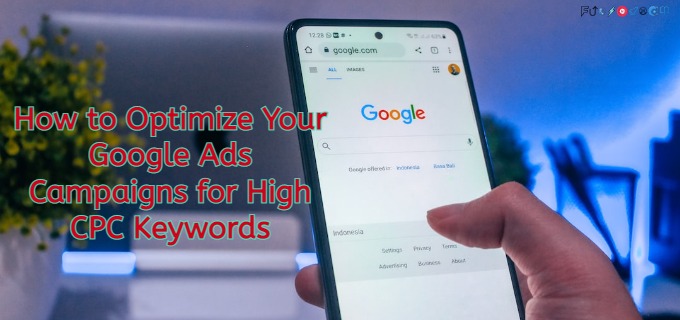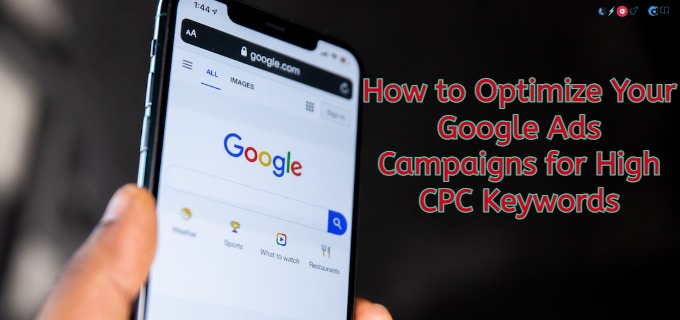Today in this post we learn About “How to Optimize Your Google Ads Campaigns for High CPC Keywords”
Optimize Your Google Ads Campaigns for High CPC Keywords
Google Ads is a powerful advertising platform that can help businesses of all sizes reach their target audiences and drive conversions.
However, advertising on Google can be expensive, especially when targeting high CPC (cost per click) keywords. In this article, we’ll discuss how to optimize your Google Ads campaigns for high CPC keywords, so you can get the most out of your advertising budget.

Conduct Keyword Research
The first step to optimizing your Google Ads campaigns for high CPC keywords is to conduct thorough keyword research. Use tools like Google Keyword Planner, SEMrush, or Ahrefs to identify the most relevant and high-value keywords for your business.
When conducting keyword research, consider both the search volume and the CPC of each keyword. Look for keywords that have a high search volume but a relatively low CPC, as these can provide the best value for your advertising budget.
- How to find “Low competition keywords list with high search volume”
- Highest CPC (cost per click) Paying Countries in the world
Use Negative Keywords
In addition to targeting relevant keywords, it’s also important to use negative keywords to exclude irrelevant or low-value search terms. Negative keywords can help prevent your ads from being shown to users who are unlikely to convert, reducing wasted ad spend and improving your ROI.
For example, if you’re a wedding photographer targeting the keyword “wedding photography,” you might want to exclude negative keywords like “cheap,” “DIY,” or “stock” to avoid showing your ads to users who are looking for free or low-quality alternatives.
Optimize Ad Copy
Your ad copy is the first thing that users will see when they encounter your ads, so it’s important to make it as compelling and relevant as possible. Use the keywords you’ve identified in your ad copy to help improve your relevance score and Ad Rank.
In addition to incorporating your target keywords, make sure your ad copy highlights the unique value proposition of your product or service. Use strong calls-to-action and ad extensions like site links or callouts to provide additional context and encourage users to click through to your website.
Optimize Landing Pages
Once users click through to your website, it’s important to ensure that they have a positive user experience and are more likely to convert. This is where landing page optimization comes in.
Make sure your landing pages are relevant to the ad copy and keywords you’re targeting. Use clear and concise headlines, high-quality images or videos, and persuasive copy to help guide users toward your desired conversion action.
Monitor and Adjust Bid Strategies
To get the most out of your advertising budget, it’s important to continuously monitor and adjust your bid strategies based on performance data. Use tools like Google Ads’ automated bidding or manual bidding options to set bids for each keyword based on your goals and budget.
Be sure to regularly review your campaign data to identify underperforming keywords or ad groups and adjust your bid strategies accordingly. This can help improve your ad relevance and reduce wasted ad spend.
- Website Article Heading Stylish Design CSS Code (10 Cool CSS Code)
- Website Hindi Mein – वेबसाइट क्या है, परिभाषा, प्रकार की पूरी जानकारी
Test and Experiment
Finally, it’s important to continually test and experiment with different ad copy, landing pages, and targeting strategies to identify what works best for your business. Use A/B testing or multivariate testing to compare different ad variations and landing page designs to identify the most effective combination.
Experiment with different targeting options, such as location targeting or device targeting, to see how they impact your performance metrics. By continuously testing and refining your campaigns, you can improve your ROI and achieve better results from your Google Ads campaigns.
Conclusion
Optimizing your Google Ads campaigns for high CPC keywords requires a combination of strategic planning, data analysis, and continuous experimentation. By conducting thorough keyword research, using negative keywords, optimizing your ad copy and landing pages, monitoring and adjusting your bid.
FAQs:
Q: What are high CPC keywords?
A: High CPC keywords are keywords that have a higher cost per click compared to other keywords in your industry. They tend to be more competitive and have a higher search volume.
Q: Why is it important to optimize for high CPC keywords?
A: Optimizing for high CPC keywords can help you reach a larger audience and drive more conversions. However, if not done properly, it can also lead to wasted ad spend and a lower ROI. By following best practices for optimizing your Google Ads campaigns for high CPC keywords, you can get the most out of your advertising budget and improve your overall performance.
Q: What are negative keywords and how do they help with high CPC keywords?
A: Negative keywords are keyword that you exclude from your targeting to prevent your ads from showing up for irrelevant searches. By using negative keywords, you can ensure that your ads are only shown to users who are more likely to convert, reducing wasted ad spend and improving your ROI.
Q: How do I know if my bid strategy is working for high CPC keywords?
A: It’s important to regularly monitor your campaign data and adjust your bid strategies based on performance. Use tools like Google Ads’ automated bidding or manual bidding options to set bids for each keyword based on your goals and budget. By regularly reviewing your campaign data, you can identify underperforming keywords or ad groups and adjust your bid strategies accordingly.
Q: How can I continually improve my Google Ads campaigns for high CPC keywords?
A: Continuously testing and experimenting with different ad copy, landing pages, and targeting strategies is key to improving your Google Ads campaigns for high CPC keywords. Use A/B testing or multivariate testing to compare different ad variations and landing page designs to identify the most effective combination.
Experiment with different targeting options, such as location targeting or device targeting, to see how they impact your performance metrics. By continuously testing and refining your campaigns, you can improve your ROI and achieve better results from your Google Ads campaigns.

